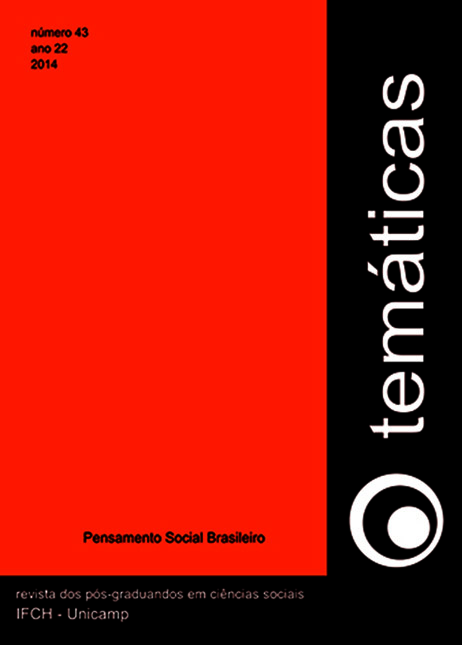Abstract
The article analyzes the social conditions of national cinema production, specifically during the “Vargas Era” (1930-1945), seeking to understand the characteristics of the formation of the Brazilian cinematographic market. The period stands out in the history of Brazilian cinema for marking the beginning of state interventions in the sector. We tried to demonstrate that, during the period in question, the state intervention ended up fomenting political disputes between the sectors involved in the segment, mainly between exhibition and production. To understand the relationship between cinema and the state, we focus our attention on the processes and conflicts involved both in the formation of state bureaucracy in the area, and in the formulation and institution of legislative measures aimed at regulating the market. We found that the relations between the Getulist government and certain social segments resulted in the transformation of a cultural elite into a political elite, which, together with the State, worked to consolidate certain ideologies that contributed primarily to the support of the political regime. Among them, a specific conception of the instrumental use of cinema, as a means of reproducing certain values that supported the ideology of the government in question.
References
BOMENY, Helena (Org.). 2001. Constelação Capanema: intelectuais e política. Rio de Janeiro: Ed. Fundação Getúlio Vargas. Bragança Paulista (SP): Ed. Universidade de São Francisco.
BRAGA, Virna Ligia Fernandes. Intelectuais Estadonovistas e a Construção do Estado Nacional. Virtú (UFJF), v. 2, p. 1-13, 2008.
CAPELATO, Maria Helena. 2003. “O Estado Novo: o que trouxe de novo?”. In: FERREIRA, Jorge e NEVES, Lucília de Almeida (Orgs.), 2003. O Brasil Republicano Vol. II. O tempo do nacional-estatismo: do início da década de 1930 ao apogeu do Estado Novo. Rio de Janeiro: Civilização Brasileira.
GALVÃO, Elisandra de Araújo. A ciência vai ao cinema: uma análise de filmes educativos e de divulgação cientifica do instituto nacional do cinema educativo. Rio de Janeiro: Universidade Federal do Rio de Janeiro, Departamento de Bioquímica Médica do Instituto de Ciências Biomédicas, Dissertação de Mestrado, 2004.
LUCAS, Taís Campelo. Cinearte: o cinema brasileiro em revista. Rio de Janeiro: Universidade Federal Fluminense, Programa de pósgraduação em História, Dissertação de Mestrado, 2005.
MILLS, C. W. A elite do poder: militar, econômica e política. In: Coleção Grandes Cientistas Sociais. Fernandes, Heloisa R. (Org.). São Paulo: Ática, 1985.
PINTO, Virgílio Noya. Comunicação e Cultura Brasileira. São Paulo: Ática, 1995.
RUBIM, Antonio Albino Canelas. Políticas Culturais no Brasil: Trajetória e Contemporaneidade. 2008. (Apresentação de Trabalho/ Comunicação).
SCHWAB, Mariana de Castro. A missão dos intelectuais brasileiros como elite dirigente no projeto político e social do Estado Novo (1937-1945). Universidade Federal do Paraná. In: II Seminário de Sociologia e Política, 2010. Curitiba. Anais do Seminário de Sociologia e Política, ISSN da publicação: ISSN 2175-6880 (Online). Curitiba, 2010, p. 3-20.
SCHWARTZMAN, Simon (Org.). Estado Novo, um auto-retrato. Brasília, CPDOC/FGV, Ed. UnB, 1983.
SIMIS, A. Estado e Cinema no Brasil. 2. Ed. São Paulo: Annablume, 2008.
SOUZA, José Inácio de Melo. Ação e imaginário de uma ditadura: controle, coerção e propaganda política nos meios de comunicação durante o Estado Novo. São Paulo: Universidade de São Paulo–ECA, Dissertação de mestrado, 1991.
VELLOSO, Mônica Pimenta. Os intelectuais e a política cultural do Estado Novo. Rio de Janeiro: Centro de Pesquisa e Documentação de História Contemporânea do Brasil – Fundação Getúlio Vargas, 1987.

This work is licensed under a Creative Commons Attribution-NonCommercial-ShareAlike 4.0 International License.
Copyright (c) 2014 Paula Assis

